- Home
- Raymond Chandler
The Lady in the Lake Page 2
The Lady in the Lake Read online
Page 2
“Has she ever been fingerprinted?”
“She has never been arrested,” he said.
“That’s not what I mean. Sometimes in large department stores they make it a condition of dropping shoplifting charges that you give them your prints. It scares the amateurs and builds up a file of kleptomaniacs in their protective association. When the prints come in a certain number of times they call time on you.”
“Nothing like that has happened to my knowledge,” he said.
“Well, I think we might almost throw the shoplifting angle out of this for the time being,” I said. “If she got arrested, she would get searched. Even if the cops let her use a Jane Doe name on the police blotter, they would be likely to get in touch with you. Also she would start yelling for help when she found herself in a jam.” I tapped the blue and white telegraph form. “And this is a month old. If what you are thinking about happened around that time, the case would have been settled by now. If it was a first offense, she would get off with a scolding and a suspended sentence.”
He poured himself another drink to help him with his worrying. “You’re making me feel better,” he said.
“There are too many other things that could have happened,” I said. “That she did go away with Lavery and they split up. That she went away with some other man and the wire is a gag. That she went away alone or with a woman. That she drank herself over the edge and is holed up in some private sanatorium taking a cure. That she got into some jam we have no idea of. That she met with foul play.”
“Good God, don’t say that,” Kingsley exclaimed.
“Why not? You’ve got to consider it. I get a very vague idea of Mrs. Kingsley—that she is young, pretty, reckless, and wild. That she drinks and does dangerous things when she drinks. That she is a sucker for the men and might take up with a stranger who might turn out to be a crook. Does that fit?”
He nodded. “Every word of it.”
“How much money would she have with her?”
“She liked to carry enough. She has her own bank and her own bank account. She could have any amount of money.”
“Any children?”
“No children.”
“Do you have the management of her affairs?”
He shook his head. “She hasn’t any—excepting depositing checks and drawing out money and spending it. She never invests a nickel. And her money certainly never does me any good, if that’s what you are thinking.” He paused and then said: “Don’t think I haven’t tried. I’m human and it’s not fun to watch twenty thousand a year go down the drain and nothing to show for it but hangovers and boy friends of the class of Chris Lavery.”
“How are you with her bank? Could you get a detail of the checks she has drawn for the past couple of months?”
“They wouldn’t tell me. I tried to get some information of the sort once, when I had an idea she was being blackmailed. All I got was ice.”
“We can get it,” I said, “and we may have to. It will mean going to the Missing Persons Bureau. You wouldn’t like that?”
“If I had liked that, I wouldn’t have called you,” he said.
I nodded, gathered my exhibits together and put them away in my pockets. “There are more angles to this than I can even see now,” I said, “but I’ll start by talking to Lavery and then taking a run up to Little Fawn Lake and asking questions there. I’ll need Lavery’s address and a note to your man in charge at the mountain place.”
He got a letterhead out of his desk and wrote and passed it over. I read: “Dear Bill: This will introduce Mr. Philip Marlowe who wishes to look over the property. Please show him my cabin and assist him in every way. Yrs. Derace Kingsley.”
I folded this up and put it in the envelope he had addressed while I was reading it. “How about the other cabins up there?” I asked.
“Nobody up this year so far. One man’s in government service in Washington and the other is at Fort Leavenworth. Their wives are with them.”
“Now Lavery’s address,” I said.
He looked at a point well above the top of my head. “In Bay City. I could find the house but I forget the address. Miss Fromsett can give it to you, I think. She needn’t know why you want it. She probably will. And you want a hundred dollars, you said.”
“That’s all right,” I said. “That’s just something I said when you were tramping on me.”
He grinned. I stood up and hesitated by the desk looking at him. After a moment I said: “You’re not holding anything back, are you—anything important?”
He looked at his thumb. “No. I’m not holding anything back. I’m worried and I want to know where she is. I’m damn worried. If you get anything at all, call me any time, day or night.”
I said I would do that, and we shook hands and I went back down the long cool office and out to where Miss Fromsett sat elegantly at her desk.
“Mr. Kingsley thinks you can give me Chris Lavery’s address,” I told her and watched her face.
She reached very slowly for a brown leather address book and turned the leaves. Her voice was tight and cold when she spoke.
“The address we have is 623 Altair Street, in Bay City. Telephone Bay City 12523. Mr. Lavery has not been with us for more than a year. He may have moved.”
I thanked her and went on to the door. From there I glanced back at her. She was sitting very still, with her hands clasped on her desk, staring into space. A couple of red spots burned in her cheeks. Her eyes were remote and bitter.
I got the impression that Mr. Chris Lavery was not a pleasant thought to her.
THREE
Altair Street lay on the edge of the V forming the inner end of a deep canyon. To the north was the cool blue sweep of the bay out to the point above Malibu. To the south the beach town of Bay City was spread out on a bluff above the coast highway.
It was a short street, not more than three or four blocks, and ended in a tall iron fence enclosing a large estate. Beyond the gilded spikes of the fence I could see trees and shrubs and a glimpse of lawn and part of a curving driveway, but the house was out of sight. On the inland side of Altair Street the houses were well kept and fairly large, but the few scattered bungalows on the edge of the canyon were nothing much. In the short half block ended by the iron fence were only two houses, on opposite sides of the street and almost directly across from each other. The smaller was number 623.
I drove past it, turned the car in the paved half circle at the end of the street and came back to park in front of the lot next to Lavery’s place. His house was built downwards, one of those clinging-vine effects, with the front door a little below street level, the patio on the roof, the bedroom in the basement, and a garage like the corner pocket on a pool table. A crimson bougainvillea was rustling against the front wall and the flat stones of the front walk were edged with Korean moss. The door was narrow, grilled and topped by a lancet arch. Below the grill there was an iron knocker. I hammered on it.
Nothing happened. I pushed the bell at the side of the door and heard it ring inside not very far off and waited and nothing happened. I worked on the knocker again. Still nothing. I went back up the walk and along to the garage and lifted the door far enough to see that a car with white side-walled tires was inside. I went back to the front door.
A neat black Cadillac coupe came out of the garage across the way, backed, turned and came along past Lavery’s house, slowed, and a thin man in dark glasses looked at me sharply, as if I hadn’t any business to be there. I gave him my steely glare and he went on his way.
I went down Lavery’s walk again and did some more hammering on his knocker. This time I got results. The Judas window opened and I was looking at a handsome bright-eyed number through the bars of a grill.
“You make a hell of a lot of noise,” a voice said.
“Mr. Lavery?”
He said he was Mr. Lavery and what about it. I poked a card through the grill. A large brown hand took the card. The bright brown eyes came back and th
e voice said: “So sorry. Not needing any detectives today please.”
“I’m working for Derace Kingsley.”
“The hell with both of you,” he said, and banged the Judas window. I leaned on the bell beside the door and got a cigarette out with my free hand and had just struck the match on the woodwork beside the door when it was yanked open and a big guy in bathing trunks, beach sandals, and a white terrycloth bathrobe started to come out at me.
I took my thumb off the bell and grinned at him. “What’s the matter?” I asked him. “Scared?”
“Ring that bell again,” he said, “and I’ll throw you clear across the street.”
“Don’t be childish,” I told him. “You know perfectly well I’m going to talk to you and you’re going to talk to me.”
I got the blue and white telegram out of my pocket and held it in front of his bright brown eyes. He read it morosely, chewed his lip and growled:
“Oh for Chrissake, come on in then.”
He held the door wide and I went in past him, into a dim pleasant room with an apricot Chinese rug that looked expensive, deep-sided chairs, a number of white drum lamps, a big Capehart in the corner, a long and very wide davenport in pale tan mohair shot with dark brown, and a fireplace with a copper screen and an over-mantel in white wood. A fire was laid behind the screen and partly masked by a large spray of manzanita bloom. The bloom was turning yellow in places, but was still pretty. There was a bottle of Vat 69 and glasses on a tray and a copper ice bucket on a low round burl walnut table with a glass top. The room went clear to the back of the house and ended in a flat arch through which showed three narrow windows and the top few feet of the white iron railing of the staircase going down.
Lavery swung the door shut and sat on the davenport. He grabbed a cigarette out of a hammered silver box and lit it and looked at me irritably. I sat down opposite him and looked him over. He had everything in the way of good looks the snapshot had indicated. He had a terrific torso and magnificent thighs. His eyes were chestnut brown and the whites of them slightly gray-white. His hair was rather long and curled a little over his temples. His brown skin showed no signs of dissipation. He was a nice piece of beef, but to me that was all he was. I could understand that women would think he was something to yell for.
“Why not tell us where she is?” I said. “We’ll find out eventually anyway and if you can tell us now, we won’t be bothering you.”
“It would take more than a private dick to bother me,” he said.
“No, it wouldn’t. A private dick can bother anybody. He’s persistent and used to snubs. He’s paid for his time and he would just as soon use it to bother you as any other way.”
“Look,” he said, leaning forward and pointing his cigarette at me. “I know what that wire says, but it’s the bunk. I didn’t go to El Paso with Crystal Kingsley. I haven’t seen her in a long time—long before the date of that wire. I haven’t had any contact with her. I told Kingsley that.”
“He didn’t have to believe you.”
“Why would I lie to him?” He looked surprised.
“Why wouldn’t you?”
“Look,” he said earnestly, “it might seem so to you, but you don’t know her. Kingsley has no strings on her. If he doesn’t like the way she behaves he has a remedy. These proprietary husbands make me sick.”
“If you didn’t go to El Paso with her,” I said, “why did she send this telegram?”
“I haven’t the faintest idea.”
“You can do better than that,” I said. I pointed to the spray of manzanita in the fireplace. “You pick that up at Little Fawn Lake?”
“The hills around here are full of manzanita,” he said contemptuously.
“It doesn’t bloom like that down here.”
He laughed. “I was up there the third week in May. If you have to know. I suppose you can find out. That’s the last time I saw her.”
“You didn’t have any idea of marrying her?”
He blew smoke and said through it: “I’ve thought of it, yes. She has money. Money is always useful. But it would be too tough a way to make it.”
I nodded, but didn’t say anything. He looked at the manzanita spray in the fireplace and leaned back to blow smoke in the air and show me the strong brown line of his throat. After a moment, when I still didn’t say anything, he began to get restless. He glanced down at the card I had given him and said:
“So you hire yourself out to dig up dirt? Doing well at it?”
“Nothing to brag about. A dollar here, a dollar there.”
“And all of them pretty slimy,” he said.
“Look, Mr. Lavery, we don’t have to get into a fight. Kingsley thinks you know where his wife is, but won’t tell him. Either out of meanness or motives of delicacy.”
“Which way would he like it?” the handsome brownfaced man sneered.
“He doesn’t care, as long as he gets the information. He doesn’t care a great deal what you and she do together or where you go or whether she divorces him or not. He just wants to feel sure that everything is all right and that she isn’t in trouble of any kind.”
Lavery looked interested. “Trouble?What kind of trouble?” He licked the word around on his brown lips, tasting it.
“Maybe you won’t know the kind of trouble he is thinking of.”
“Tell me,” he pleaded sarcastically. “I’d just love to hear about some kind of trouble I didn’t know about.”
“You’re doing fine,” I told him. “No time to talk business, but always time for a wisecrack. If you think we might try to get a hook into you because you crossed a state line with her, forget it.”
“Go climb up your thumb, wise guy. You’d have to prove I paid the freight, or it wouldn’t mean anything.”
“This wire has to mean something,” I said stubbornly. It seemed to me that I had said it before, several times.
“It’s probably just a gag. She’s full of little tricks like that. All of them silly, and some of them vicious.”
“I don’t see any point in this one.”
He flicked cigarette ash carefully at the glass-top table. He gave me a quick up from under look and immediately looked away.
“I stood her up,” he said slowly. “It might be her idea of a way to get back at me. I was supposed to run up there one week-end, I didn’t go. I was—sick of her.”
I said: “Uh-huh,” and gave him a long steady stare. “I don’t like that so well. I’d like it better if you did go to El Paso with her and had a fight and split up. Could you tell it that way?”
He flushed solidly behind the sunburn.
“God damn it,” he said, “I told you I didn’t go anywhere with her. Not anywhere. Can’t you remember that?”
“I’ll remember it when I believe it.”
He leaned over to snub out his cigarette. He stood up with an easy movement, not hurried at all, pulled the belt of his robe tight, and moved out to the end of the davenport.
“All right,” he said in a clear tight voice. “Out you go. Take the air. I’ve had enough of your third-degree tripe. You’re wasting my time and your own—if it’s worth anything.”
I stood up and grinned at him. “Not a lot, but for what it’s worth I’m being paid for it. It couldn’t be, for instance, that you ran into a little unpleasantness in some department store—say at the stocking or jewelry counter.”
He looked at me very carefully, drawing his eyebrows down at the corners and making his mouth small.
“I don’t get it,” he said, but there was thought behind his voice.
“That’s all I wanted to know,” I said. “And thanks for listening. By the way, what line of business are you in—since you left Kingsley?”
“What the hell business is it of yours?”
“None. But of course I can always find out,” I said, and moved a little way towards the door, not very far.
“At the moment I’m not doing anything,” he said coldly. “I expect a commission i
n the navy almost any day.”
“You ought to do well at that,” I said.
“Yeah. So long, snooper. And don’t bother to come back. I won’t be at home.”
I went over to the door and pulled it open. It stuck on the lower sill, from the beach moisture. When I had it open, I looked back at him. He was standing there narrow-eyed, full of muted thunder.
“I may have to come back,” I said. “But it won’t be just to swop gags. It will be because I find something out that needs talking over.”
“So you still think I’m lying,” he said savagely.
“I think you have something on your mind. I’ve looked at too many faces not to know. It may not be any of my business. If it is, you’re likely to have to throw me out again.”
“A pleasure,” he said. “And next time bring somebody to drive you home. In case you land on your fanny and knock your brains out.”
Then without any rhyme or reason that I could see, he spat on the rug in front of his feet.
It jarred me. It was like watching the veneer peel off and leave a tough kid in an alley. Or like hearing an apparently refined woman start expressing herself in four-letter words.
“So long, beautiful hunk,” I said, and left him standing there. I closed the door, had to jerk it to get it shut, and went up the path to the street. I stood on the sidewalk looking at the house across the way.
FOUR
It was a wide shallow house with rose stucco walls faded out to a pleasant pastel shade and trimmed with dull green at the window frames. The roof was of green tiles, round rough ones. There was a deeply inset front door framed in a mosaic of multi-colored pieces of tiling and a small flower garden in front, behind a low stucco wall topped by an iron railing which the beach moisture had begun to corrode. Outside the wall to the left was the three-car garage, with a door opening inside the yard and a concrete path going from there to a side door of the house.

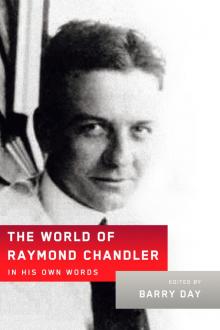 The World of Raymond Chandler: In His Own Words
The World of Raymond Chandler: In His Own Words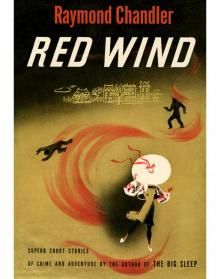 Red Wind: A Collection of Short Stories
Red Wind: A Collection of Short Stories The Big Sleep
The Big Sleep Killer in the Rain
Killer in the Rain Playback
Playback The Simple Art of Murder
The Simple Art of Murder The Bronze Door
The Bronze Door The Little Sister
The Little Sister The Lady in the Lake
The Lady in the Lake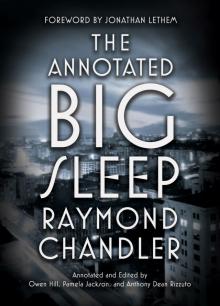 The Annotated Big Sleep
The Annotated Big Sleep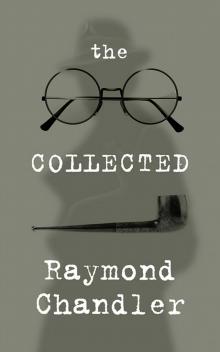 The Collected Raymond Chandler
The Collected Raymond Chandler Collected Stories (Everyman's Library)
Collected Stories (Everyman's Library) Farewell, My Lovely
Farewell, My Lovely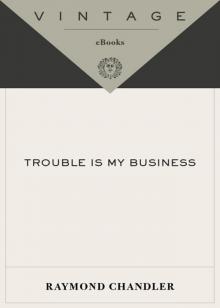 Trouble Is My Business
Trouble Is My Business The Long Goodbye
The Long Goodbye The Lady in the Lake pm-4
The Lady in the Lake pm-4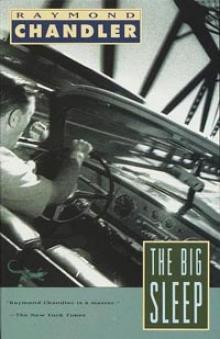 The Big Sleep pm-1
The Big Sleep pm-1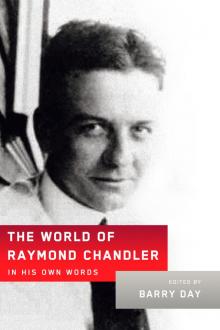 The World of Raymond Chandler
The World of Raymond Chandler Collected Stories of Raymond Chandler
Collected Stories of Raymond Chandler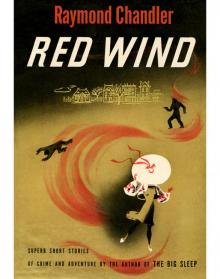 Red Wind
Red Wind Farewell, My Lovely pm-2
Farewell, My Lovely pm-2 The Raymond Chandler Papers: Selected Letters and Nonfiction, 1909–1959
The Raymond Chandler Papers: Selected Letters and Nonfiction, 1909–1959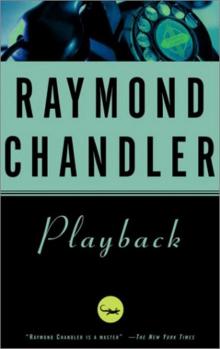 Playback pm-7
Playback pm-7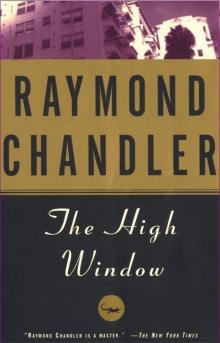 The High Window pm-3
The High Window pm-3 The Little Sister pm-5
The Little Sister pm-5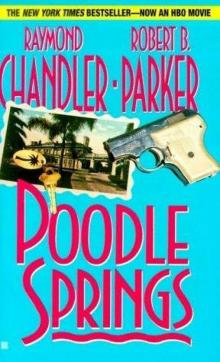 Poodle Springs (philip marlowe)
Poodle Springs (philip marlowe)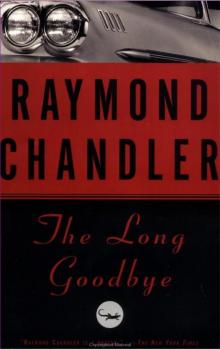 The Long Goodbye pm-6
The Long Goodbye pm-6